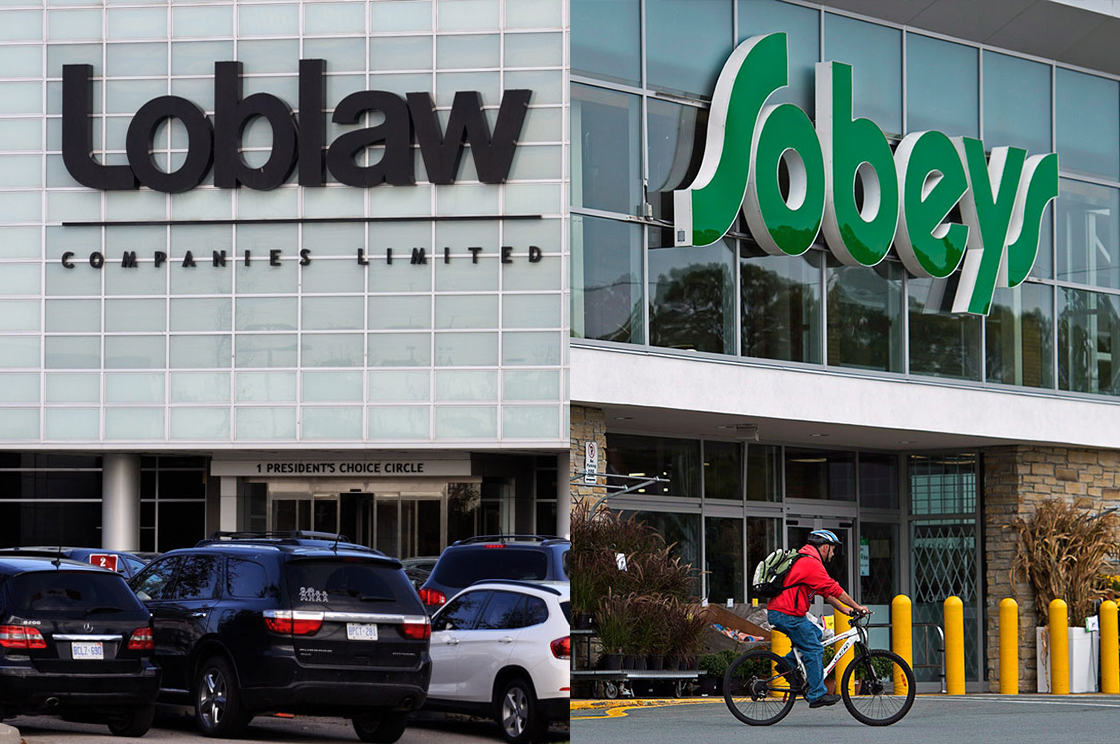Consumers may be about to feel the full weight of the country’s two dominant grocery chains, both of whom have added considerable heft and could be planning to start throwing it around, according to experts.

With job cuts and store closures largely behind them, Loblaw Co. Ltd. and Empire Co. Ltd. (owner of Sobeys and Safeway) are now turning their combined attention toward the end-game of their blockbuster acquisitions of Shoppers Drug Mart and Safeway, respectively, last year: netting a bigger slice of cash from shoppers, experts say.
“The big consolidations of 2014 should finally begin to bear fruit,” CIBC World Markets retail stock analysts said in a recent research report.
The fruit will come in the form of pricing and promotional strategies that mean less head-to-head competition between chains, and more sales squeezed from customers, the analysts said.
“Already we have seen some coordination of advertising programs to avoid direct item conflicts,” the CIBC report said. “But more importantly, the reduction in the number of competitors in both drug and food makes price checking and price signalling that much easier,” the analysts said.
“It fosters a much calmer, more coordinated market.”
Loblaw announced in July it was closing 52 unprofitable stores over the next year to help boost its bottom line. That announcement followed a similar one from Empire in mid-2014 that it was closing about 50 locations following its $5.8-billion purchase of Safeway Canada.
The pair of mega-deals, which were approved by regulators after Loblaw and Empire agreed to sell off some stores, mean about half of Canadian supermarket sales are controlled by the two retailers, CIBC estimated.
MORE: Are discount grocery stores becoming a myth?
Scrutiny urged
Loblaw and Empire each argued that their added scale would benefit shoppers by allowing the retailers to buy more wholesale volumes. The savings they got from the bulk purchases would give them the flexibility to pass the discounts onto customers, they said.
But consumer groups and some academics warned when the deals were first announced that shoppers could suffer from higher prices.
“We view this as a loss of competition,” Bruce Cran, president of the Consumers’ Association of Canada, said of the deals.
MORE: Scrutiny urged over supermarket mega-mergers
In a paper published on the Loblaw-Shoppers transaction, Douglas West, an economist and chair of the Department of Economics at the University of Alberta, called for an extensive analysis of prices on overlapping product lines.
“You have all these local markets across the country and the competitive intensity will vary by market,” West said at the time.
“I live in a little suburb of Vancouver, and we’ve got a Safeway and a Sobeys,” the CAC’s Cran said.
The loonie’s sharp decline as well as skyrocketing meat prices have already accelerated growth in supermarket prices. Food inflation remained relatively stable for several years following the recession, but began rising sharply at the beginning of 2014, Statistics Canada data show.
MORE: Shoppers spending more on food thanks to loonie’s drop
Loblaw did not respond to requests for comment. On a conference call Thursday, Empire executives said hiccups with their integration efforts in the latest quarter had created delays in introducing the grocer’s new pricing strategies, but the holdups weren’t significant.
Next year
CIBC’s analysts said Loblaw and Empire still have work to do, but their respective pricing strategies should be fully phased in by next year. “By 2016, the most important element – pricing strategy – should be determined and coordinated,” the report from Aug. 12 said.
Empire is clearly showing it’s still a work in progress. The company said Wednesday earnings fell 14 per cent compared to the same period last year, citing costs associated with the integration of Safeway.
“From a pricing and promotional point of view it’s been more business as usual, with a few experiments here and there,” Marc Poulin, Sobeys CEO said on the call. “We’ve always said we want to make the transition to the new systems and processes first and foremost before we look at the way we market.”
MORE: Facing leaner times, Alberta grocery shoppers ‘trade down’
Belt-tightening among shoppers in Western Canada, where Safeways outnumber Sobeys, could also keep a lid on price growth, experts say.
Supermarket prices in regions sideswiped by the oil downturn will be difficult to raise and could actually tick lower, Kenric Tyghe, a retail stock expert at financial services firm Raymond James, said. “Necessitated by a more price sensitive Western Canadian consumer.”
Still, grocery shoppers elsewhere won’t likely see anything close to lower food prices, the CIBC research note said. Next year “should be the culmination of consolidation: a distinctly less competitive marketplace.”


Comments